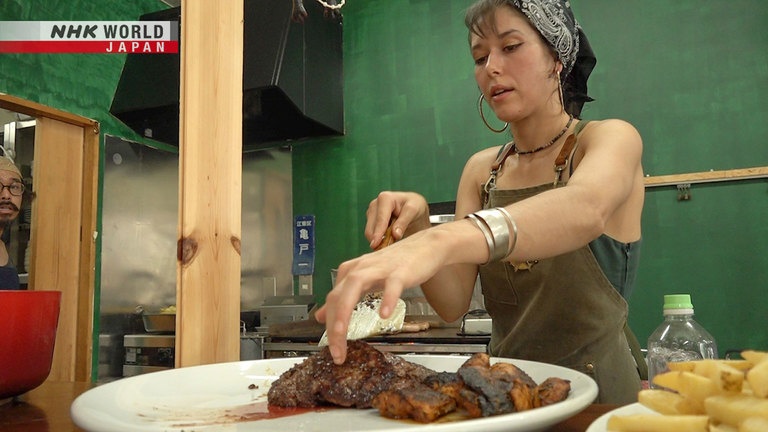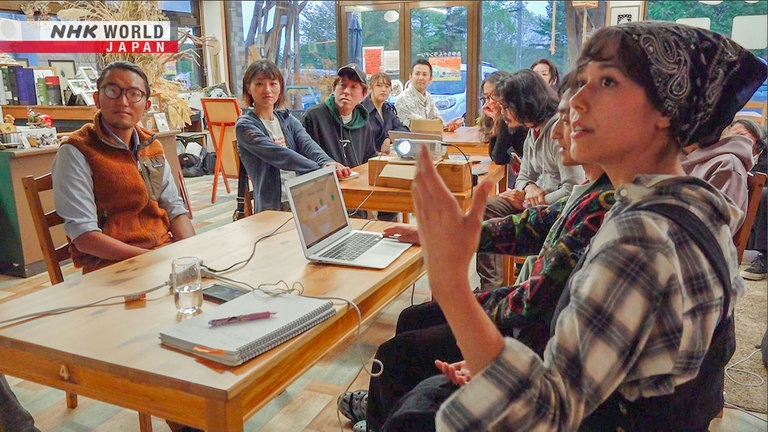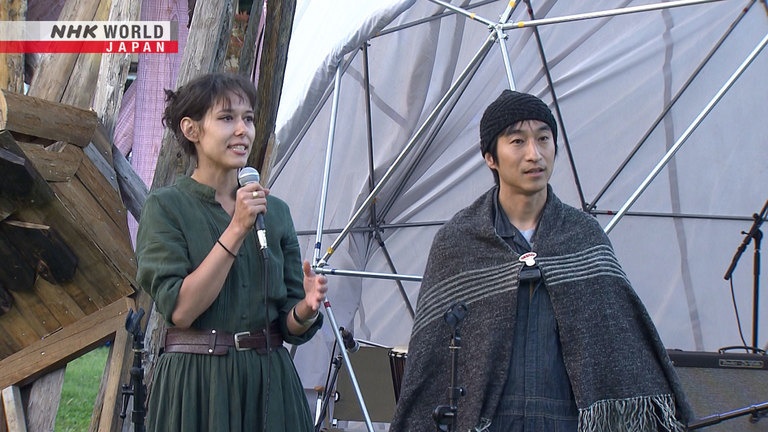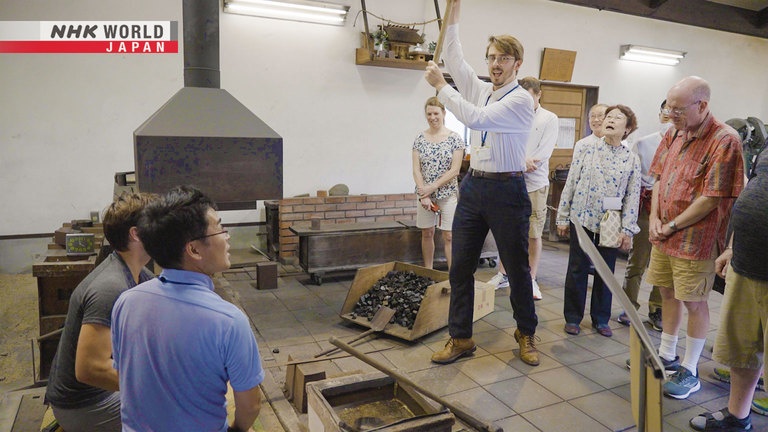Kayla's Festival of Friendship
We visit the Iizuna Highlands in Nagano Prefecture where Canadian Kayla Afrin runs a popular café. Having grown up under foster care due to losing her parents at a young age, she treasures her connection to the people of Iizuna. With local friends, Kayla organizes a big festival. However, as she is getting ready for the event, life brings a new hardship. Join us to find out more. We also meet Tumi Grendel Markan from the UK, an English-speaking guide at a Japanese sword museum in Setouchi, Okayama Prefecture.




Transcript
Where We Call Home
The Iizuna Highlands in Nagano City...
...are the location of a popular café.
It's a place for the locals to meet and relax.
Preparing meals is this Canadian woman.
Here you are!
Kayla Afrin, who moved to Japan in 2019.
She set up her café hoping to create a gathering spot for the highlanders.
"Open!"
And, wishing to build even more connections within the community, she took on a new endeavor.
"The moment I saw that place, and I looked at it, this beautiful campground with this pond,
and I was like: ‘Man, let's have a festival here. It's so beautiful!'"
She and her friends are organizing a festival.
- You're OK?
- Yes.
We followed Kayla over six months, as she prepared for this collective project.
Peeking out from beyond the Nagano City center is Mount Iizuna, more than 1,900 meters high.
Spreading below, the Iizuna Highlands are a 20-minute drive from downtown Nagano.
Home to a camping ground, it's an area that draws in many tourists.
Right by the site is Kayla's café.
She named it "Koshikake," a Japanese word that means "a spot to sit on," well-suited for a place to unwind.
It opened in 2021.
Kayla runs the business with her husband Daisuke.
Good morning!
Drawn by the rich natural landscape, many people settled down in the region.
Kayla started her café with the hope it would help newcomers get to know one another.
A popular menu item is her homemade hamburger.
A generous beef patty seasoned with Caribbean-style spices.
It often sells out.
- "How is it?"
- Very good.
Very 'American!'
Kayla was born in Vancouver, Canada, in 1993 to a Caucasian father and Afro-Cuban mother.
However, right from her early childhood, life brought a series of trials.
When Kayla was only four years old, her father was the victim of a criminal incident, that cost him his life.
To cope with the shock, her mother fell into alcoholism, and became unable to raise her children.
Kayla grew up with some relatives and in foster homes.
Later, her mother too passed away.
And, earlier this year, her brother, from whom she'd been separated through childhood,
and who had been homeless, was found dead.
"When I was younger, I remember feeling very alone and very detached from the world."
"And, what I needed to do to keep moving was form a purpose."
And so, in search for a purpose in life, after university, Kayla traveled the world.
That's when she met Daisuke, who was working in IT at the time.
Looking to start a new life together, they moved to Iizuna and got married.
Kayla, who'd been deprived of close family ties, values friendship above all.
She treasures connections
between people unrelated by blood.
She values the local community.
I'm her only family here in Japan.
So, she strongly wishes to build ties
with the people who live here.
Kayla also puts a lot of effort into her other passion project:
the festival held on the camping site.
With the participation of many people, she aims to create a place and occasion for all to enjoy music and art.
Last year, thanks to help from the regulars at the café,
the festival "Mori no Koshikake," or "A Place to Rest in the Forest," was born.
Though it was a success, it had required a lot of effort to prepare and finance it.
"All of these people really put their heart and soul into making the festival happen and helping me,
because they just wanted to, really. They did it for no compensation, and they gave it their everything."
"And I was very, very impressed, because rarely do I meet people like that in this life."
Mid-May. In preparation for this year's festival, the couple gathered their friends for a meeting.
As this will be the second edition, they mobilized even more people to help make the event an annual occurrence from now on.
Kayla makes a suggestion.
"Hi, let's start, let's start! OK!"
"So, just going over some of the newer things that happened in our business structure."
"We want to be a cooperative business, and I want to explain that to you guys."
"So, 'Koshikake,' as you know,
but we want to expand from just a café to a festival, to an eco-village, and into an enterprise."
Kayla proposes the founding of a cooperative, where people sharing the festival's vision
would contribute financially and manage the event, making it easier to hold it every year.
Kayla also wants to further expand on the original theme.
"Our main goals of the festival have always been healing, or cooperation and connection."
"And then, I was thinking that maybe, it would be a good idea to start with healing
since we have the history of Iizuna music, right?"
Summer has come to the highlands.
At the café, mouth-watering dishes line the counter.
They're having a barbecue party.
It's one of the many events held for the local community to socialize.
This is also to gather funds for the festival.
The menu features Kayla's specialties, recipes she learned while living with relatives in Florida.
"Then we had some American stuff too, you know. We had a hamburger, sausage, some grilled chicken...
kind of standard barbecue things. And then, yeah, the special today was the... this Caribbean food."
"...just community event. It's the summertime, and we should have a little party."
And to strengthen connections among the members working on the festival, a live performance takes place.
Rocking up the café is a band called "The Factors."
On guitar is Miyashita Jody Tenku, a native of Iizuna, who understands Kayla's vision,
and is participating in organizing the upcoming big event.
This is Jody Tenku's studio.
His father was a composer and performer of new-age, or healing music, based in the Iizuna Highlands, Miyashita Fumio.
Miyashita's name is forever engraved in the cultural history of Iizuna.
This year's festival also aims to commemorate the 20th anniversary of his passing.
I was moved by Kayla
and Daisuke's passion...
and their character.
Just between you and me, I hope
the festival will be as big as Fuji Rock...
and support the local community.
It'd be a major event in Nagano.
Gotta dream big!
More and more people, sympathetic with the philosophy behind the festival, are joining the cooperative.
All set!
"Give me the money."
Seeing all the efforts they put in,
I want to contribute in any way I can.
This summer brings good news to the young couple.
Kayla is pregnant.
As she couldn't grow up living with her own parents,
the thought of having a child worried Kayla, but she knows she's not alone.
"I started thinking about what would I do if we died? Who would take care of our kid?"
"And I actually realized that I have this beautiful family;
I have people that I trust, that actually would step up and take care of that kid,
and that, for the first time in my life I felt, wow,
I already have the community that I've been trying to build."
"I already have the family that I've been trying to build."
"It's right here. And yeah, it was a beautiful moment."
However, this happiness was only momentary.
Two weeks later, Daisuke heads out to submit some documents for the cooperative.
It's a big step for the festival.
But Kayla isn't accompanying her husband to city hall.
- That's all for now.
- Thank you.
He explains she isn't feeling well, and is resting at home.
She's ten weeks pregnant. They did tests.
The baby's developing, but...
they still can't detect a heartbeat.
It's a little worrying.
Then, at the café's entrance, a notice.
"Closed temporarily."
Kayla had a miscarriage.
The café was closed for a month.
Though Kayla isn't here to lead the project, her friends take over.
- I'll put it up outside.
- Thank you.
The poster was designed by Kayla.
- Hang in there.
- Thank you!
- No envelope, but...
- We'll use it wisely.
They hand out posters and gather donations.
- I'll put it here.
- Nice!
- Very visible.
- Yes.
- A little contribution.
- Thank you!
- It's not much.
- It is!
A month later, at an event held at a shrine in another part of Nagano City...
...Keyla is among the participants.
Little by little, she's coming to terms with her feeling of loss.
Her friends are here to encourage her.
This shrine worships a deity for kids.
"Children...god."
- Here?
- Here.
- Really?
- Yes.
This shrine is also
for a god of childbirth.
Let's go pray.
They offer a prayer for the god of childbirth.
Next to the main shrine is a smaller one.
The Japanese religion of Shintoism is a polytheistic faith,
meaning that a single shrine is often dedicated to the worship of more than one deity.
"I lost the baby, and I had a miscarriage."
"Uhmm, but the kind of person that I am, as I want to use all of those horrible things,
and turn it into something else. I want to say that energy is never wasted. You can transform it."
Autumn makes an early arrival to the highlands.
The time of the "Mori no Koshikake" festival has come.
Overcoming her sadness, Kayla moves forward.
- You're OK?
- Yes.
- "I might have to move it."
- "Watch, out! Watch out! Watch out!"
Supervising the stage setup and live performances is Jody Tenku.
He took care of finding performers and concert staff...
... and does other odd jobs.
The shed behind the café found some unwanted tenants: hornets.
Needless to say, they pose a risk to both staff and spectators.
Jody makes short work of their large nest.
I'll do anything for the concerts...
... even removing nests!
Thanks to the support of Kayla's friends, the festival is ready to begin.
Keyla put a small altar by the pond.
She wanted a spot to offer prayers, and her friends set it up for her.
She put photographs of her family members who passed on.
Her mother...
... grandmother...
... father...
... brother...
... and for her baby she didn't have the chance to meet.
She prays for them to watch over the festival.
More than 40 stalls sell all kinds of products.
Daisuke worked hard to find participants.
"Good evening, everyone!"
"I just want to say thank all of you so much for making this possible."
"Like, we could not make this event happen without all of you."
"Really! So, from the bottom of my heart, I really want to say thank you."
Thanks for coming. It means a lot!
Let's start the Koshikake Festival!
Over 40 acts, including professionals, perform.
Many are from Nagano Prefecture, and some even came from Tokyo and Kyoto.
The event lasts for three days.
The energy of the festival draws everyone in.
The bonds, that unite Keyla and her newfound family, are stronger than ever.
"I can feel it, you know?"
"I can heal it, you know?"
"Here I am"
"Here we are"
"Now our lives are here"
"Oh, I'm so happy when I'm being hugged by all these happy people!"
"I feel amazing!"
"So, I think it was a really beautiful thing that just happened right here."
"And I was so happy to be a part of it."
"Mori no Koshikake, ahhh"
Hi! I'm Tumi from the UK.
I'm a guide at the Bizen Osafune
Sword Museum.
I want to promote the appeal
of Japanese swords to the world.
Setouchi, Okayama Pref.
Eastern Okayama was once called Bizen.
It was the leading sword-producing
region in Japan.
Around 40% of swords that are national
and cultural treasures were made in Bizen.
Bizen Osafune Sword Museum
"Thank you very much!"
"Thank you very much!"
Today, a cultural exchange group
visits the museum.
I'm Sugihara, this museum's curator.
"So, this is the curator, Sugihara."
I heard there many visitors
from New Zealand today.
So, I asked our English guide
Tumi for help.
"My name is Tumi, and I'll be translating into English for all of you from abroad."
Many of the guests from abroad
have never seen Japanese swords.
Tumi gives a short lecture on the basics.
"... and especially, the amount of curve, and the point section, the length of that, change massively between periods."
- "How tall are you?"
- "Uh, 180."
"180."
He's 180.
Please stand about here.
"So, if you could stand about here."
Look at the sword.
"And please have a look at the sword."
"So, if you stand in the correct place based on your height in centimeters,
you should be able to see that the "hamon," which is the wavy line,
is lit up by the reflection of the spotlight, basically."
"Depending on where you stand, you can either see everything or nothing."
"But, of course, while they're beautiful, there's a specific way that you should look at them."
"There was similarities with how to look at art."
"So, yeah, that was very interesting to me."
- "I'll be in touch."
- "Excellent!"
"Thank you!"
Tumi had an interest in European
medieval weaponry from childhood.
On his 18th birthday, his mother gave
him a book on katana: Japanese swords.
Tumi found a new passion.
In 2018, he worked for six months
as an intern at the museum...
and later became a full-time employee.
European weapons of the Middle Ages
are essentially historical artifacts.
They're seen as a culture
that's now extinct.
But there still are swordsmiths in Japan.
It's a culture that still has value
and importance today.
I see katana as symbols that encompass
Japanese culture as a whole.
So, for that reason...
I wanted to do this kind of work
here at the museum.
This is my supervisor,
Sugihara-san, the curator.
He teaches me so much.
He's now in his second year...
as a full-time staff here.
He learns so quickly what his work
and position involves.
Other staff members have come
to rely on him.
I'm so glad to see his progress.
Keep it up!
Yes.
On his days off, Tumi learns sword-making
from an artisan at the museum's workshop.
Shave here as much as possible.
You can shave the rest along that.
Tumi is working on the "habaki," which
holds the sword in place in its scabbard.
I think this is the best place
to study Japanese swords.
It's got so many great katana on display.
And this is the only museum that also has
a swordsmith who forges katana.
Maybe a bit more.
He rapidly learns and follows
my instructions. I'm amazed.
I hope he becomes my apprentice,
and does engravings in the blades.
My treasure is this knife
my wife made for me.
Tumi met his wife during a knife-making
workshop held at the museum.
He cherishes this memento
that brought them together.
We were at the same museum
on the same day.
What were the odds of us meeting?
I can't help but think it was fate.
Today, katana aren't weapons.
They are precious cultural assets.
So, I want to keep learning about them.